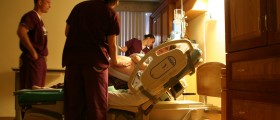
Down's syndrome is caused by an extra chromosome being present in the body of an individual. The development of this extra chromosome normally occurs during the formation of the sperm or egg. When the egg is fertilized, the cell will thus have forty seven rather than the normal forty six chromosomes. There are three different types of Down's syndrome: trisomy 21, translocation and mosaicism. The majority of Down's syndrome people fall into the first category, trisomy 21.
Causes
The extra chromosome and subsequent cell division is the cause of Down's syndrome. However, the cause of this division of cells is not entirely understood. It is known that the chances of conceiving a Down's syndrome baby increases as the mother ages. For example, about one in one hundred mothers over forty will conceive a Down's syndrome child, whereas the number is just one in fifteen hundred in mothers aged 20-30. Conception of a Down's syndrome child has nothing to do with social class, race or environment. It is believed that nothing can be done to increase or decrease the chances of a Down's syndrome conception in an individual mother.
Down's syndrome babies are usually identified as such in the first few days after birth. Maternity doctors and nurses are trained to recognize the physical characteristics of a Down's syndrome child. A chromosome test will be necessary in order to complete a correct and accurate diagnosis. There are also screening tests that normally take place during the third and sixth months of pregnancy.
Symptoms
Certain physical features are often characteristic of those with Down's syndrome. These physical features might include low-set, upward-sloping eyes with epicanthic folds, a small mouth and protruding tongue, a flattened nose bridge, broadened hands, small ears, and a low birth weight and short stature. Presence of some of these features does not necessarily indicated Down's syndrome, and not all Down's syndrome people will display all of these features.
Complications
Those with Down's syndrome often suffer from problems with the heart, eyes, hearing, thyroid and digestive system. People with the condition might also have problems with poor immunity, chest infections and the early onset of dementia. Thus, it is vital that Down's syndrome people often undergo health checks in order to ensure early treatment and identification of any potential complications.
Down's syndrome people might also have some difficulties with regard to learning at the same rate as others, particularly from a young age.

















Your thoughts on this
Loading...